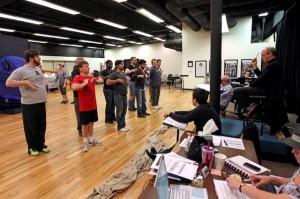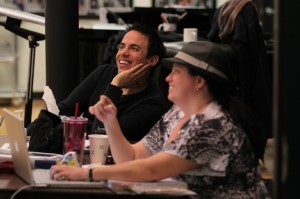 CHITTY CHITTY BANG BANG (1968); Dir. Ken Hughes; Starring Dick Van Dyke, Sally Ann Howe, Gert Fröbe and Lionel Jeffries; Starts Friday, March 29 ; Plaza Atlanta; Trailer here.
CHITTY CHITTY BANG BANG (1968); Dir. Ken Hughes; Starring Dick Van Dyke, Sally Ann Howe, Gert Fröbe and Lionel Jeffries; Starts Friday, March 29 ; Plaza Atlanta; Trailer here.
By Aleck Bennett, Contributing Writer
The Plaza Theatre has a long, storied and—at times—notorious past. So leave it to them to revive one of the most frightening memories of my childhood by bringing CHITTY CHITTY BANG BANG back to the big screen.
As a tiny tot, my family would drive across town every weekend to have lunch at my grandparents’ house. And being a movie fiend at even that young age, I’d plop down to watch whatever was playing on the Sunday Afternoon TV Movie that week while everyone talked in the kitchen and prepped the meal. There was a certain rotation to the movies they’d schedule, and it seemed like every couple of months or so they’d show either the Beatles’ YELLOW SUBMARINE or—more likely—CHITTY CHITTY BANG BANG. And I’d sit enraptured by the movie every time, even though I knew what was coming and that it would scare the pants off me.
Sure, most of the movie is harmless enough stuff. It’s set in the salad days of the 1910s, before the specter of World War I darkened the horizon. There’s Dick Van Dyke being his typical charming self as the perpetually failing inventor Caractacus Potts, but he could play charming in his sleep. There’s Sally Ann Howe in the Julie Andrews–as-Mary Poppins-eque role of Truly Scrumptious (Andrews herself was offered the role, but turned it down; it then went to Howe, who had replaced Andrews on Broadway in MY FAIR LADY). There are memorable songs from Disney’s celebrated in-house composers Richard and Robert Sherman. There are a couple of precious kids, a kindly grandfather and, best of all, a magical car named Chitty Chitty Bang Bang (after the sounds it makes while running). Despite the film’s meandering tone and frequent tangential detours, once we start seeing the car in action, it becomes something thrillingly charming.
 The story has its roots in the children’s book by—strange as it may seem—Ian Fleming, creator of James Bond. He was sidelined from writing the Bond novels due to protracted lawsuits surrounding THUNDERBALL. Constantly stressed about the case, Fleming suffered two major heart attacks. During his recuperation, he set out to write a book based on a bedtime story he’d concocted for his son Caspar. Fleming, sadly, did not live to see the book published. A mere two months before its publication, on Caspar’s 12th birthday, Ian Fleming succumbed to a third and fatal heart attack.
The story has its roots in the children’s book by—strange as it may seem—Ian Fleming, creator of James Bond. He was sidelined from writing the Bond novels due to protracted lawsuits surrounding THUNDERBALL. Constantly stressed about the case, Fleming suffered two major heart attacks. During his recuperation, he set out to write a book based on a bedtime story he’d concocted for his son Caspar. Fleming, sadly, did not live to see the book published. A mere two months before its publication, on Caspar’s 12th birthday, Ian Fleming succumbed to a third and fatal heart attack.
Fleming is not the only Bond connection to the film, though. It was produced by Albert “Cubby” Broccoli, co-producer of the classic Bond films. It was directed by Ken Hughes, fresh off directing his segment of the Bond spoof CASINO ROYALE. The film co-stars Gert “Auric Goldfinger” Fröbe and Desmond “Q” Llewellyn. And, most importantly, it was adapted for the screen by the screenwriter of the previous year’s YOU ONLY LIVE TWICE: renowned children’s author and close friend of Fleming’s, Roald Dahl. And that’s where things get weird. And scary.
See, Dahl’s sensibilities were so black as to be nearly morbid. His CHARLIE AND THE CHOCOLATE FACTORY, for example, has so many kids meeting their (non-fatal) ends that it’s practically THE HUNGER GAMES set in the candy manufacturing industry. So Dahl (along with director Hughes) took great liberty with the source material and created something nearly as traumatic as the boat ride in 1971’s WILLY WONKA AND THE CHOCOLATE FACTORY or the flying monkeys in 1939’s THE WIZARD OF OZ.
During the course of the movie’s ambling narrative, we learn that Baron Bomburst, the tyrannical leader of Vulgaria, wants to steal Chitty Chitty Bang Bang. He sends two spies to kidnap Potts and force him to build a duplicate, but they kidnap Truly Scrumptious’ father and Grandpa Potts by mistake. Caractacus, Truly and the kids take off in Chitty to rescue the oldsters, and fly to the dreary country.
Why is the country so dreary, you might ask? Because there are no children on the streets of Vulgaria. And why not, you ask again? Because of…
*shudder*
A character created entirely by Dahl for the film, Sir Robert Helpmann’s portrayal of the grotesque Child Catcher is one of the most frightening cinematic creations ever to be foisted upon unsuspecting movie-going children. The character is in the employ of the Baron and Baroness Bomburst, who hate children so much that the sight of them sends the couple into fits of fear and loathing. With his spindly legs, pasty face, black clothing, warped top hat and enormous nose (with which he can smell the very presence of the little rugrats: “This nose of mine has never failed me. And if there are children here, my friend, you will die.”), he tempts children out of hiding with promises of lollipops and treacle tarts and then takes them away in his carriage to be imprisoned.
And this is where I’d be sent into paroxysms of terror. Not even the presence of Benny Hill as a gentle toymaker could save me. No, this guy wormed his way into my consciousness and took root. He still freaks me out a little. And I’m not the only one. The character was voted in a 2005 BBC poll as “the scariest villain in books,” despite never appearing in the book. In 2009, a poll carried out by Penguin Books named him as the seventh scariest character of all time.
The Child Catcher even figures prominently as an avatar of childhood fright in the earlier, funnier work of Marilyn Manson. On the band’s debut album, PORTRAIT OF AN AMERICAN FAMILY, he is obliquely the subject of the song “Organ Grinder,” which features samples of the character calling out “Here we are children! Come and get your lollipops! Lollipops! Come along my little ones!” Manson’s second release, SMELLS LIKE CHILDREN, was even named in the character’s honor and featured Mr. Manson on the cover dressed in the Child Catcher’s garb.
 So toss your cynicism aside and let the film take you back to a more innocent time. The journey may go all over the place, plot-wise, but it’s a scenic route. And the Plaza may not have a magical flying car, but taking a trip with CHITTY CHITTY BANG BANG costs you only the price of a ticket. Come along, kiddie-winkies!
So toss your cynicism aside and let the film take you back to a more innocent time. The journey may go all over the place, plot-wise, but it’s a scenic route. And the Plaza may not have a magical flying car, but taking a trip with CHITTY CHITTY BANG BANG costs you only the price of a ticket. Come along, kiddie-winkies!
Aleck Bennett is a writer, blogger, pug warden, pop culture enthusiast, raconteur and bon vivant from the greater Atlanta area. Visit his blog at doctorsardonicus.wordpress.






